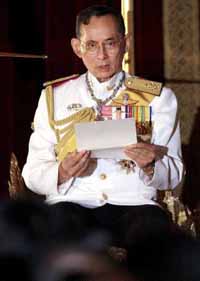Swiss man gets 10 years in prison for defacing images of Thai king
A Swiss man was sentenced to 10 years in prison Thursday for spray-painting graffiti over images of Thailand's revered king, the first conviction of a foreigner in at least a decade under strict Thai laws protecting the monarchy.

Oliver Rudolf Jufer, 57, who had pleaded guilty to five counts of lese majeste, or insulting the monarchy, had faced a maximum sentence of 75 years in prison. Shackled at the ankles and dressed in an orange prison uniform, Jufer was expressionless as the verdict was read and made no comment to reporters as he was ushered from the courtroom into a prison van.
Judge Phitsanu Tanbukalee told the court that Jufer was given a reduced sentence since he had admitted his wrongdoing. He has a month to appeal.
Jufer was caught by surveillance cameras on Dec. 5 spray-painting black paint over five outdoor posters of King Bhumibol Adulyadej in the northern city of Chiang Mai, where he lived, police and prosecutors said.
According to earlier testimony read aloud in court Thursday, Jufer had been drinking with a friend that night and drove his motorcycle home to pick up a can of spray-paint, which he had bought to paint his dog house, according to court clerk Nahathai Bachai.
He drove up to a municipal office where a large poster of the king was hung outside, and climbed a ladder to spray paint over the image. He then defaced four other posters near his home, according to the testimony.
Bhumibol, who is greatly loved by Thais and regarded by some as semi-divine, is protected from reproach by strict laws that forbid any criticism of the monarchy.
The vandalism coincided with Bhumibol's 79th birthday, which was celebrated across Thailand with fireworks and prayers.
Millions of portraits of the king, who is the world's longest serving monarch, were hung late last year around the country to honor his birthday. Many Thais wear bright yellow shirts every Monday, the color that in Buddhist tradition represents the day of the week on which Bhumibol was born.
Jufer, who has lived in Thailand for 10 years, faced a penalty of three to 15 years for each of the five posters he defaced.
His case casts a rare spotlight on Thailand's strict lese majeste laws, which have remained virtually unchanged since the creation of the country's first criminal code in 1908, despite the overthrow of an absolute monarchy in 1932.
Bangkok's Criminal Court said its national database, which goes back a decade, showed that no foreigner had been convicted of lese majeste charges in at least 10 years. A handful of foreigners have faced similar charges in the past, but most were eventually deported to their home countries.
Jufer's March 12 hearing was closed to the media to minimize publicity of his offense against the king. But journalists were allowed into Thursday's sentencing.
Thai television and newspapers have relied on foreign news agencies to cover the trial. The Thai media and people in general almost never make controversial comments about the king in public.
Jufer's court-appointed lawyer, Komkrit Kunyodying, called the penalty "appropriate for the crime he has committed," adding he did not yet know if his client planned to appeal.
The Swiss Embassy issued a tempered criticism.
"We respect the Thai justice system," said Jacques Lauer, deputy chief of mission at the embassy in Bangkok, but he added that it was a "tough" verdict.
Subscribe to Pravda.Ru Telegram channel, Facebook, RSS!





